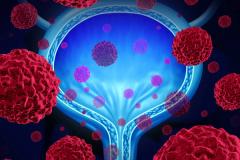
Novel 2L Treatment Approaches in Advanced Bladder Cancer
Expert perspectives on novel treatment strategies in the second-line treatment setting of advanced bladder cancer.
Episodes in this series

Transcript:
Petros Grivas, MD, PhD: The other quick question that comes in clinical practice is [whether to] rechallenge with the same treatment if we run out of options. We published [a] retrospective study a few weeks ago looking at patients getting a rechallenge with a checkpoint inhibitor if they had it before…. The point was that if patients had previously no progression or checkpoint inhibition, they actually might benefit sometimes from rechallenge. Of course, [this is] a case-by-case scenario. So it’s not something we do in clinical practice a lot. Have you done it before, Lisa? I know there isn’t much data, so we tend not to use a single-agent checkpoint inhibitor rechallenge.
Lisa Adams, PA-C: There have been times in bladder and other tissue types where, if options were limited and there weren’t any absolute contraindications to a checkpoint inhibitor, we might try a different checkpoint inhibitor and still see some response. That is also a discussion with the patient and letting them know we’re a little bit outside of the data zone. But in the setting where we don’t have any other options, it’s a good option and something they can try.
Petros Grivas, MD, PhD: Emily, I know we had a trial open here at our center with Dr Zhang looking at immunotherapy and neutron radiation therapy. I think we published the trial. And it’s an interesting question, combining the 2 and the potential of inducing an immunogenic response.
Emily S. Weg, MD: We have not published it yet, but hopefully soon. If the trial is closed now, then yes, that was designed by my colleague Dr Zhang, with a really innovative concept using neutron radiation, which is a form of particle therapy that is unfortunately not available anywhere else in the United States outside of the Hutch [Fred Hutchinson Cancer Center in Seattle, Washington]. There are some unique biological features associated with neutron therapy that [may make it] particularly be more immunogenic than conventional x-ray radiation. So potentially, [it is] a sort of tumor vaccine that could help promote the impact of immunotherapy. It’s a really novel concept, and hopefully we’ll be able to read the data soon.
Petros Grivas, MD, PhD: Absolutely, and it’s very exciting to see clinical trials like this. And we’ll look at immunotherapy-based combinations. We try to come up with some reasonable mechanistically sound combinations. I think in the future we may use more combination therapies. Again, they have to be tested in clinical trials. And hopefully, more biomarkers. We will hopefully live in the future in a more personalized precision oncology paradigm. Right now, we don’t use many biomarkers. And that applies to both systemic therapy and radiation. So I think we’re definitely getting there. And Emily, I know there is also research in the field for radiation oncology biomarkers, right?
Emily S. Weg, MD: Yes, absolutely. Especially DNA damage repair gene alterations. A lot of work is underway to try to understand how patients with those somatic mutations may have tumors that are particularly vulnerable to the type of damage caused by radiation.
Transcript edited for clarity.
Newsletter
Stay up to date on recent advances in the multidisciplinary approach to cancer.







































